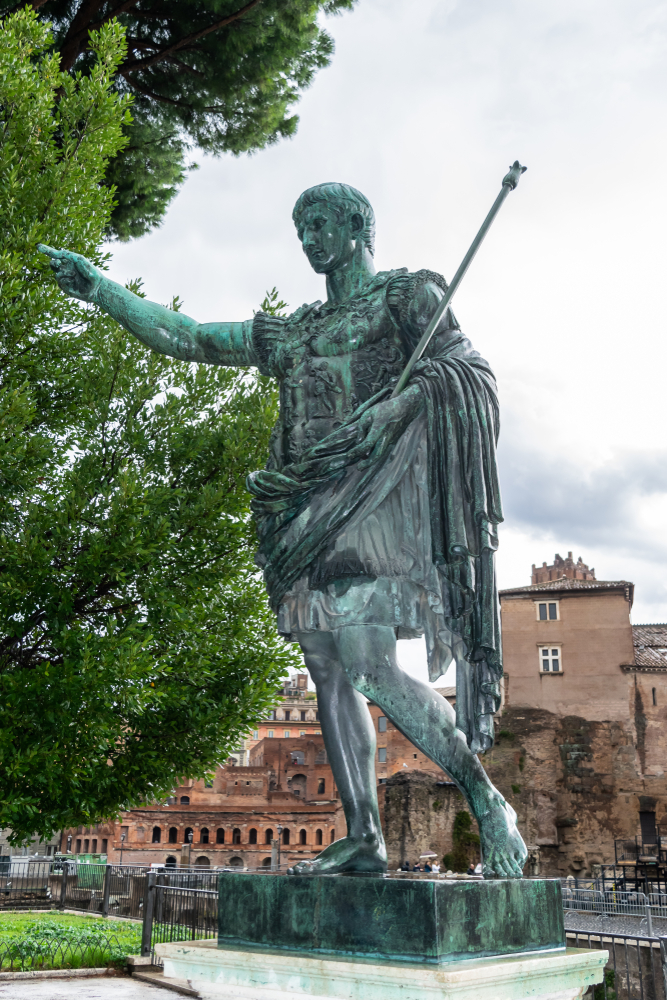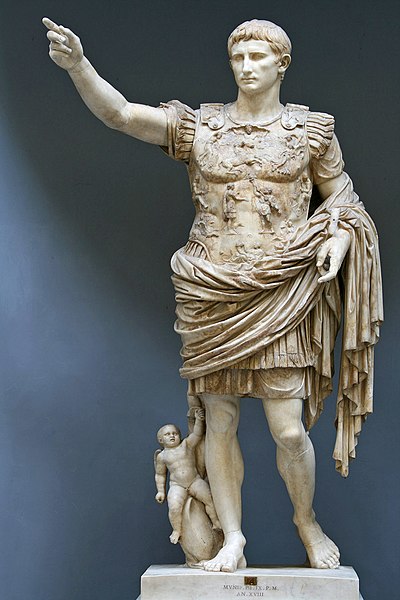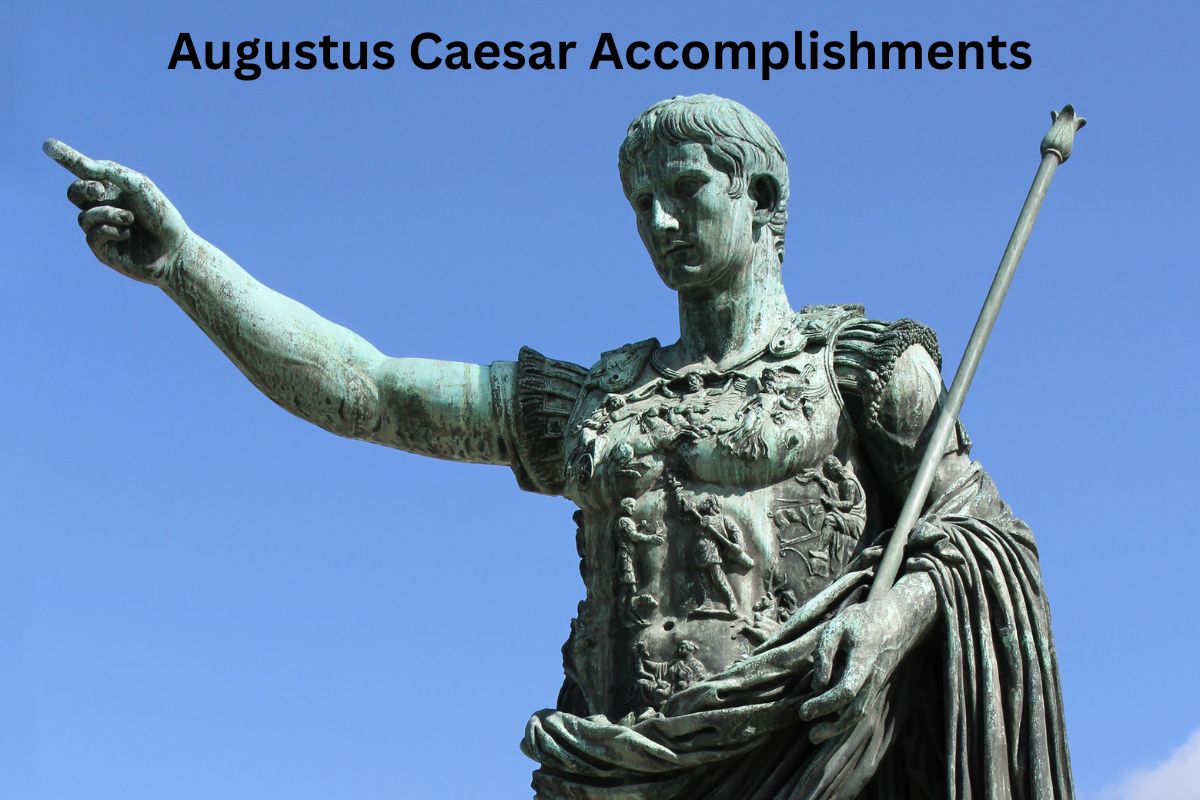Augustus Caesar, also known as Octavian, was the first Roman emperor and ruled from 27 BCE until his death in 14 CE. He achieved numerous accomplishments during his reign, which transformed Rome and set the stage for the Roman Empire.
He established the Roman Empire, brought stability through the Pax Romana, implemented administrative and legal reforms, and promoted social values.
Augustus developed infrastructure, patronized arts and literature, expanded Roman territory, reformed the military, introduced standardized coinage, and established a cult of emperor worship.
Accomplishments of Augustus Caesar
1. Establishment of the Roman Empire
Augustus Caesar ended the Roman Republic and established the Roman Empire. After years of political instability and civil wars, he emerged as the sole ruler of Rome.
Also Read: Facts About Augustus
Through a combination of military victories and political maneuvering, he consolidated power and transformed Rome from a republican system to an autocratic one, with himself as the first emperor.

2. Pax Romana (Roman Peace)
One of Augustus’ most significant achievements was bringing stability and peace to the Roman Empire. The period of Pax Romana refers to the relative peace and stability that prevailed throughout the empire during his reign and continued for approximately two centuries.
This era was marked by reduced internal conflicts, strong central governance, and improved economic conditions, allowing for social and cultural advancements within the empire.
3. Administrative and legal reforms
Augustus introduced substantial administrative and legal reforms that had a lasting impact on the Roman Empire. He reorganized the bureaucracy, establishing a more efficient system of governance.
He also codified Roman laws and initiated legal reforms to ensure consistency and fairness. These reforms provided a foundation for the Roman legal system, which would influence legal frameworks in Western civilization for centuries to come.
4. Social reforms
Augustus implemented a series of social reforms aimed at strengthening traditional Roman values and promoting family life. He recognized that a decline in the population and moral values posed a threat to the empire.
To encourage marriage and childbirth, he passed legislation such as the Lex Julia, which provided incentives for families with multiple children. Augustus also promoted the ideal of paterfamilias, emphasizing the authority and responsibility of the male head of the household.

5. Infrastructure development
Augustus initiated extensive infrastructure development projects throughout the Roman Empire. He understood the importance of efficient communication, transportation, and urban planning for the empire’s stability and growth.
Under his reign, vast networks of roads were constructed, facilitating trade, military movements, and administrative control. He also oversaw the construction of aqueducts to supply water to urban centers, bridges for improved connectivity, and public buildings for civic purposes.
6. Patronage of arts and literature
Augustus was a notable patron of arts and literature, contributing to a cultural renaissance in Rome. He supported and sponsored many renowned writers, poets, and artists, including Virgil, Horace, and Livy.
These intellectuals produced influential works that celebrated Rome’s history and mythology, glorified Augustus’ reign, and promoted Roman values. Augustus himself encouraged the production of monumental architecture and artworks, leaving a lasting artistic legacy in the form of statues, temples, and public structures throughout the empire.
This patronage fostered a flourishing intellectual and artistic climate in Rome, making it a center of culture and creativity.
7. Expansion of Roman territory
Augustus Caesar undertook military campaigns and diplomacy to expand the boundaries of the Roman Empire. He successfully conquered and annexed various territories, including Egypt, Hispania (Spain), and parts of Germania (Germany).
These conquests extended Roman influence, secured important resources and trade routes, and increased the empire’s wealth and power. Augustus also established client kingdoms and entered into alliances with neighboring regions, further solidifying Roman control and dominance.
8. Reformation of the army
Augustus implemented significant military reforms to strengthen the Roman army, which played a crucial role in maintaining the empire’s security. He reorganized and professionalized the military, creating a standing army known as the Praetorian Guard.
These highly trained and loyal soldiers served as the emperor’s personal bodyguards and played a vital role in maintaining his authority. Augustus also improved the pay, benefits, and living conditions of soldiers, ensuring their loyalty and effectiveness in defending the empire.
9. Coinage reforms
Augustus introduced standardized coinage throughout the Roman Empire, which had a profound impact on the economy. He established a uniform system of currency, making it easier for trade and commerce to flourish within and beyond Roman borders.
The widespread use of Roman coins facilitated economic stability, reduced transaction costs, and promoted a unified monetary system throughout the empire. Augustus’ coinage reforms played a crucial role in enhancing economic growth and consolidating Roman economic dominance.
10. Cult of emperor worship
Augustus established a cult of emperor worship, emphasizing his deified status. This religious practice, known as the Imperial Cult, aimed to enhance the emperor’s authority and unite the diverse populations of the empire under a central figure.
Temples and statues were erected, rituals were performed, and divine honors were bestowed upon Augustus and subsequent emperors. The cult of emperor worship became an integral part of Roman religious and political life, serving as a unifying force and reinforcing the emperor’s position as a divine ruler.
